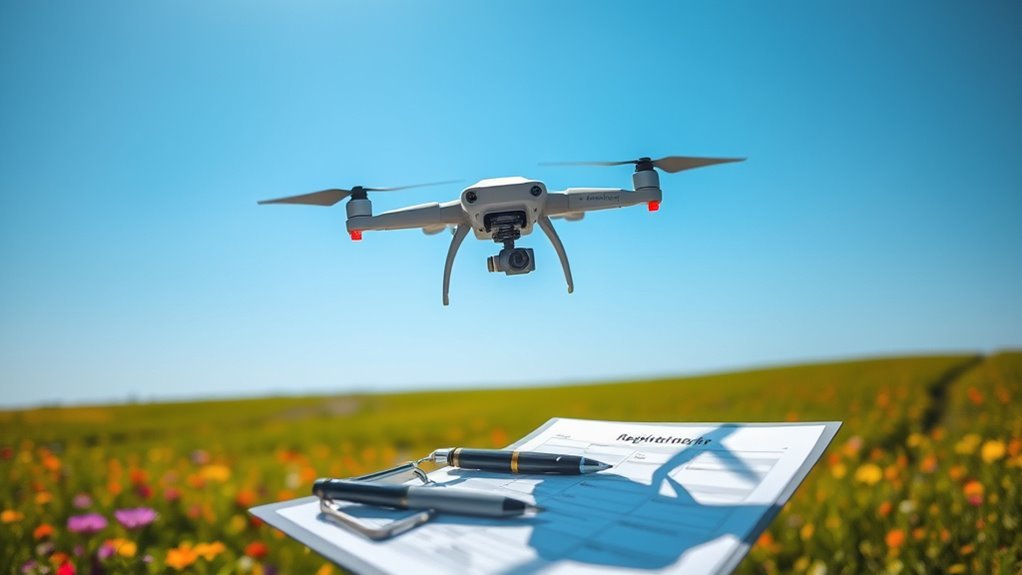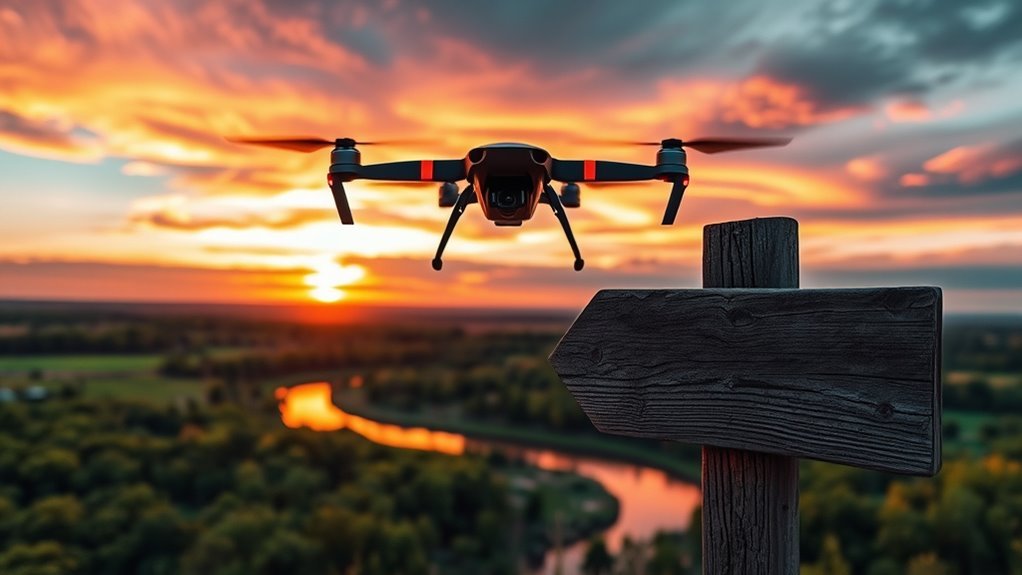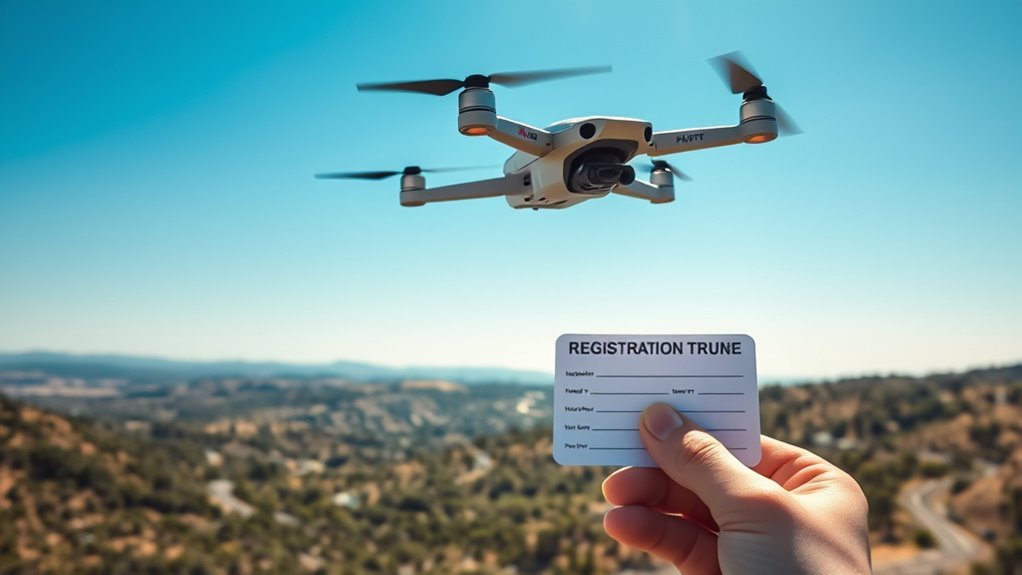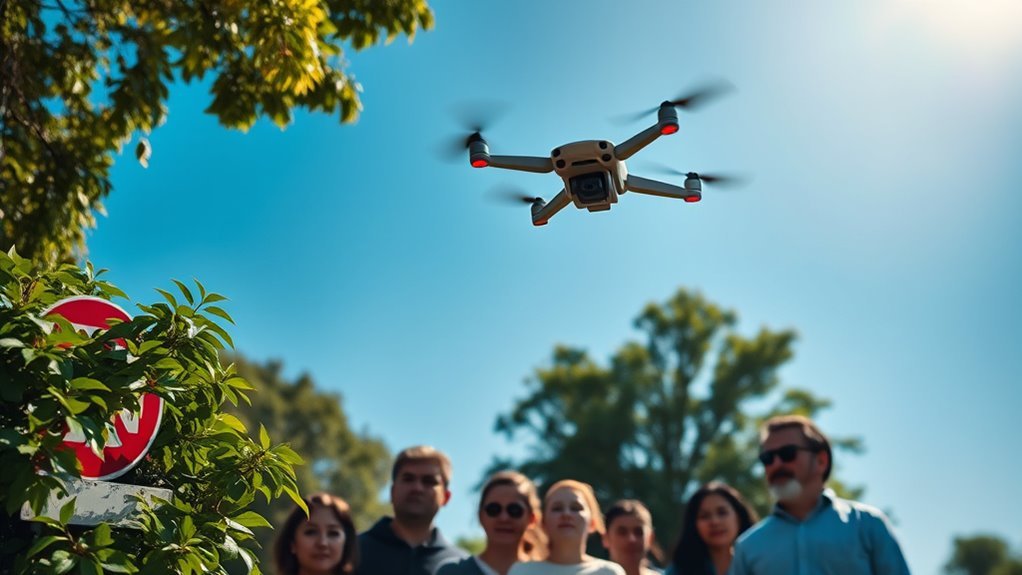Yes, drones typically need to be registered if they weigh over 0.55 pounds, especially in countries like the U.S. and Russia. This registration enhances safety, guarantees accountability, and helps authorities track drones. If you fly commercially or recreationally, complying with these regulations is vital. Failing to register can lead to fines and other legal issues. Curious about the registration process or costs involved? There’s plenty more to learn about drone registration and its benefits.
Understanding Drone Registration Requirements

Have you ever wondered if your drone needs to be registered? Understanding the registration requirements is essential for drone ownership. In many countries, like the U.S., you’ll need to register your drone if it weighs over a certain limit, typically 0.55 pounds. This registration isn’t just a bureaucratic hurdle; it carries significant implications for your freedom to fly. Failing to register could lead to fines or restricted access to airspace, limiting your ability to enjoy your hobby. By registering, you’re not only complying with the law but also ensuring accountability, which can enhance safety for everyone involved. In Russia, for instance, drones over 250 grams must be registered with the Federal Air Transport Agency. Additionally, registration helps authorities track drones in case of incidents. So, before you take to the skies, make sure you’re informed about the registration process and its implications for your drone adventures.
Types of Drones That Need Registration

While you might be enthusiastic to take your drone out for a spin, it’s important to know which types of drones require registration. If you’re flying a commercial drone that weighs more than 0.55 pounds, the law mandates that you register it. This applies to any drone used for business purposes, including photography, surveying, or inspections. Additionally, local regulations dictate that recreational drones also need registration if they exceed the same weight limit. Even if you’re flying for fun, knowing the requirements helps you enjoy your hobby without legal worries. Furthermore, compliance with local laws ensures a safe and responsible drone experience. So, whether you’re a weekend flyer or a commercial operator, make sure your drone is registered to keep your flights free and compliant.
The Registration Process Explained

To register your drone, you’ll need to follow a straightforward process that verifies you’re compliant with regulations. Despite the advancements in drone technology, many face registration challenges. Here’s how you can get started:
- Visit the FAA website: This is your go-to resource for official guidelines and online registration.
- Provide necessary details: You’ll need to input information like your drone’s make, model, and serial number.
- Pay the registration fee: A small fee confirms your drone is officially recognized.
Costs Associated With Drone Registration
When you’re registering your drone, it’s essential to understand the fees involved. The registration process often comes with a standard fee, but there are additional costs you might not anticipate, such as updates or renewals. Knowing these expenses upfront can help you budget effectively and avoid surprises later on.
Registration Fees Overview
Understanding the costs associated with drone registration is essential for any pilot looking to comply with regulations. The registration fee structures can vary greatly based on your location, so it’s important to stay informed about regional fee variations that may apply to you.
- Expect a standard fee for initial registration, often around $5.
- Renewals typically occur every three years, costing the same as the initial fee.
- Some regions may impose additional charges for specific types of drones or commercial use.
Additional Costs Considerations
While the initial registration fees are relatively straightforward, there are additional costs to evaluate that can impact your overall budget as a drone operator. Hidden expenses often lurk in the shadows, ready to surprise you. For instance, you might want to think about drone insurance, which can safeguard your investment against accidents and liability claims. Depending on your usage, premiums can vary greatly, so it’s wise to shop around for the best coverage. Additionally, if you plan to use your drone for commercial purposes, you might face costs related to required training or certifications. Ultimately, factoring in these expenses guarantees you’re fully prepared to enjoy your aerial adventures without financial stress.
Consequences of Flying an Unregistered Drone
Flying an unregistered drone can lead to significant legal repercussions that every operator should be aware of. Not only could you face hefty fines, but the consequences extend beyond just legal penalties. Here’s what you need to take into account:
- Fines and Penalties: Authorities can impose fines that vary based on the severity of the infraction.
- Insurance Implications: Operating without registration may void your insurance coverage, leaving you vulnerable in case of accidents.
- Legal Liability: If your drone causes damage or injury, you could be held personally liable, facing lawsuits that can be financially devastating.
Understanding these consequences is essential for maintaining your freedom as a drone operator. Stay informed, and guarantee compliance to enjoy your flying experience without unnecessary risks.
Exceptions to Registration Rules
Although many drone operators are required to register their devices, there are specific exceptions to these rules that you should know about. If you’re flying exempt drones, like those weighing less than 0.55 pounds (250 grams), you won’t need to register. This is especially relevant for hobbyists, as some hobbyist regulations allow you to operate these lightweight drones without the hassle of registration. Additionally, if you’re using your drone strictly for educational purposes or under certain exemptions during events, you may also avoid registration. Understanding these exceptions can enhance your freedom to fly without unnecessary restrictions. Always check the latest regulations to guarantee compliance while enjoying your aerial adventures!
Benefits of Registering Your Drone
Registering your drone isn’t just a legal formality; it guarantees you’re compliant with regulations that keep the skies safe. By registering, you also enhance safety measures and can greatly improve your chances of recovering your drone if it gets lost or stolen. Let’s explore these essential benefits and how they can impact your flying experience.
Legal Compliance Assurance
When you decide to register your drone, you’re not just complying with legal requirements; you’re also ensuring that you’re flying within the bounds of safety and responsibility. By registering, you tackle legal implications head-on and navigate compliance challenges more easily. This proactive approach helps you enjoy your flying experience without the fear of penalties.
- Protects you from potential fines and legal issues
- Enhances accountability for your actions in the air
- Promotes responsible drone use within your community
In a world where drone regulations are tightening, staying compliant means you can focus on creativity and exploration. Registering your drone empowers you to soar freely, knowing you’re respecting the laws that keep the skies safe for everyone.
Enhanced Safety Measures
Safety is paramount in the world of drone flying, and registering your drone greatly enhances that aspect. By ensuring your drone is registered, you contribute to a safer flying environment, which is vital as drone technology evolves. Registration allows authorities to track and manage airspace more effectively, minimizing the risk of accidents and unauthorized flights. You’ll also benefit from access to essential updates regarding regulations and safety practices. This knowledge empowers you to operate your drone with confidence and responsibility. Furthermore, registered drones can be identified quickly in case of incidents, promoting accountability among pilots. Ultimately, embracing registration supports enhanced safety, allowing you to enjoy the freedom of flying while protecting yourself and others in the skies.
Improved Recovery Chances
By taking the step to register your drone, you greatly boost the chances of recovering it if it ever goes missing. When registered, your drone has improved searchability, making it easier for others to identify it as yours. This simple act can lead to enhanced recovery in several ways:
- Identification: Your contact information is linked to the drone, allowing finders to reach out directly.
- Community Awareness: A registered drone fosters a sense of responsibility among fellow hobbyists, encouraging them to return lost devices.
- Legal Backup: In case of disputes, registration provides proof of ownership, simplifying the recovery process.
Ultimately, registering your drone isn’t just about compliance; it’s about ensuring you maintain your freedom to operate and enjoy your flying experience.
Staying Updated With Regulatory Changes
As regulations surrounding drone usage continue to evolve, staying informed about these changes is essential for any operator. You’ve got to keep an eye on regulatory updates that can impact your flying experience and your right to operate. This means setting up a system for compliance tracking, whether through newsletters, regulatory websites, or community forums. Engage with fellow drone enthusiasts and experts who can share insights and updates. Not only will this knowledge keep you compliant, but it’ll also empower you to navigate the skies with confidence. Remember, ignoring these changes could lead to penalties or loss of flying privileges. Stay proactive, and guarantee your passion for flight remains unencumbered by legal obstacles. Additionally, understanding federal laws protecting drones can help you avoid any inadvertent violations while operating.
Frequently Asked Questions
Can I Fly My Drone Indoors Without Registration?
You can fly your drone indoors without registration, but always prioritize indoor flying safety. Make certain your space is clear of obstacles and people. Familiarize yourself with your drone’s features for a smooth, controlled experience.
Do I Need a License to Operate a Registered Drone?
Imagine soaring like Icarus; drone operation’s thrilling but comes with responsibilities. You’ll need a license depending on your drone’s weight and purpose. Check the licensing requirements to guarantee your freedom doesn’t lead to unexpected consequences.
How Do I Update My Drone Registration Information?
To update your drone registration information, access the drone registration process online, log in to your account, and follow prompts for updating personal information. It’s crucial to keep your details current for compliance and safety.
Are There Age Restrictions for Drone Registration?
Imagine soaring through the skies with your drone! However, age requirements for registration do exist; you must be at least 13 years old to start the registration process. So, check your eligibility before flying high!
What Should I Do if My Drone Is Lost or Stolen?
If your drone’s lost or stolen, implement drone recovery strategies immediately. Notify local authorities and follow theft reporting procedures. Document everything, including serial numbers and any evidence, to increase your chances of retrieval. Stay proactive!

